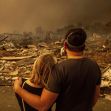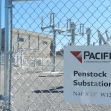In a battle about the legal meaning of a key phrase in the governing statute, the California Supreme Court determined that a non-profit corporation was liable for over $12 million in costs caused by one of its employees who negligently ignited a fire that destroyed almost 7,500 acres of land near Santa Barbara.
Writing for a unanimous Court, Justice Joshua P. Groban authored the opinion in which the Chief Justice and five other justices concurred. The opinion affirmed the decision by Justice Martin J. Tangeman of Division Six of the California Court of Appeal, but said it was “answering a narrower question than the one presented.” The petitioner in the case is Presbyterian Camp and Conference Centers, Inc. (Presbyterian) v. The Superior Court of Santa Barbara County, respondent and the Department of Forestry and Fire Protection, which is the real party in interest.
The case originated with the 2016 “Sherpa Fire” that took nearly 2,000 firefighters a month to extinguish. Presbyterian owned and operated Rancho La Sherpa and employed Charles Cook as operations manager. The costs of extinguishing and investigating the fire were borne by the California Department of Forestry and Fire Protection (CalFire), which went to court to obtain reimbursement from Presbyterian for its $12 million firefighting expenditures.
CalFire’s investigation ultimately determined that the “Sherpa Fire” was caused by Cook, who removed a “smoldering log from a malfunctioning fireplace” and unsafely set it down in an outdoor fire pit. When embers blew into nearby dry vegetation, the fire ignited and soon spread to other properties. CalFire’s investigation concluded that Cook was negligent in a number of ways that amounted to misdemeanor fire safety violations.
These included: setting a fire in a malfunctioning fireplace; failing to properly maintain the fireplace; setting the log down near dry vegetation, not clearing vegetation within 100 feet of the cabin; failing to install and maintain smoke detectors; and having no fire extinguishers or access to a water supply.
The key question before the court was whether a corporation could be held vicariously liable in this situation. The Supreme Court’s answer was its interpretation of the governing section of the State Health and Safety Code (the Code), titled “Liability in Relation to Fires.” That section, Groban wrote “incorporate(s) the common law theory of respondeat superior,” but concluded it applies to only that and not “other types of vicarious liability.”
According to the Legal Information Institute at Cornell Law School, respondeat superior is a common law principle often used in tort cases. It holds employers legally responsible for the wrongful acts of their employees if the acts occur within the scope of employment.
Groban began his opinion with an explanation of the relevant statute in the Code, which governs the incident. Code Sections, he said, permit recovery of costs from “any person…who negligently sets a fire, allows a fire to be set, or allows a fire kindled or attended by him or her to escape” to the property of another. As a result of this statute, CalFire sought recovery of all its firefighting expenses from Presbyterian.
A key question in the case related to a 1971 Code amendment that contained new “stand-alone language” that eliminated the need to cross-reference the negligence definition with other Code sections. The new controlling language said costs would be paid by, “Any person who negligently, or in violation of the law, sets a fire, allows a fire to be set, or allows a fire kindled or attended by him to escape into any forest.” Presbyterian, however, asked the court to find that the language change “implicitly eliminated (it from) respondeat superior liability.”
Groban disagreed. At issue was one particular phrase in the amendment. Presbyterian argued that the Code imposes liability on a person who “personally or through another” causes a fire. They claimed that “through another,” which was not present in the 1971 amendment, eliminated respondeat superior liability for firefighting costs.
After a lengthy discussion of law, precedent, and California’s 150 year-long recognition of the doctrine of respondeat superior, the opinion said, “We find Presbyterian’s theory to be both an arbitrary interpretation of the law and one that is difficult to apply on a practical basis.” Groban also wrote that he could not agree with Presbyterian “unless the Legislature had expressed a clear intent to abrogate (the) common law doctrine” of respondeat superior, which it did not do. In addition, he explained that “respondeat superior has long been a bedrock doctrine of the common law.”
“Neither the plain language of the statute nor the legislative history supports Presbyterian’s position,” Groban wrote. “Moreover, Presbyterian’s interpretation of the statutory amendment would undermine the policy goals that motivate the law.” He emphasized that “through another” did not refer to the doctrine of respondeat superior as Presbyterian claimed. He concluded, “In light of the enduring importance of respondeat superior in our common law and the conciliatory approach courts have taken in construing statutory enactments against the backdrop of existing common law, we understand (the Code section) as having incorporated the common law theory of respondeat superior.”
This opinion reinforces several public policy goals. It will reimburse government agencies for the costs of firefighting, something that is increasingly critical in these times of drought and climate change. It prevents taxpayers from subsidizing negligence and encourages corporations to take precautionary measures.






